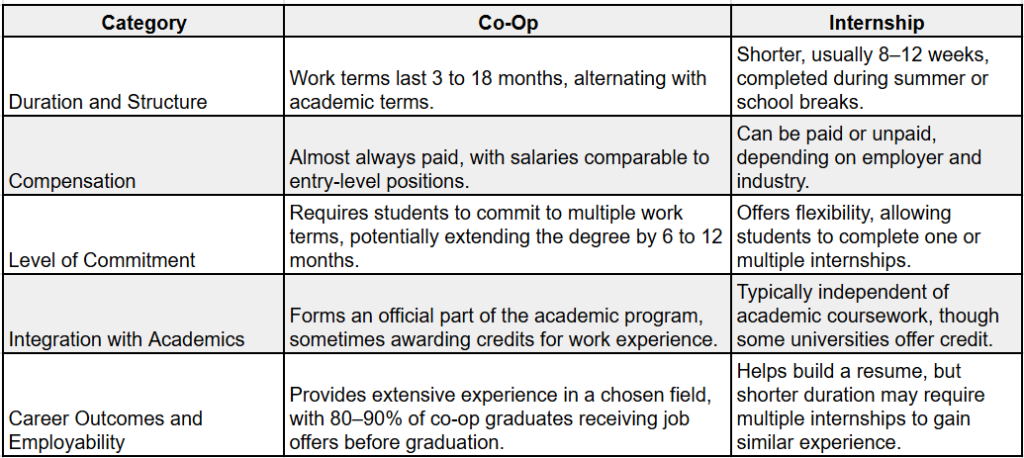For university students looking to gain real-world experience before graduation, two common options stand out: co-op programs and traditional internships. While both provide valuable work experience and networking opportunities, they differ in structure, length, commitment, and potential career outcomes. Understanding these differences is crucial for students deciding which path aligns best with their academic and professional goals.
What Are Co-Op Programs?
Cooperative education programs, or co-ops, are structured partnerships between universities and employers that integrate work experience into a student’s academic curriculum. Co-op programs typically alternate periods of full-time work with periods of academic study. These work terms are paid and can last anywhere from three months to over a year, depending on the program and industry.
In the United States, institutions such as Northeastern University, Drexel University, and University of Waterloo in Canada are well known for their co-op programs. In these institutions, students may complete three to five co-op placements during their undergraduate degree, extending their total time in school by a year but significantly increasing their work experience before graduation.
What Are Traditional Internships?
Internships, on the other hand, are generally shorter work experiences that students complete alongside or in between semesters of study. They typically last 8–12 weeks and can be either paid or unpaid, depending on the employer and industry. Internships can be full-time during the summer or part-time during the academic year.
Internships are more flexible than co-ops, allowing students to explore different industries or roles without committing to extended time away from their studies. They are common in fields like business, media, healthcare, and nonprofit work, where employers frequently recruit summer interns to assist with projects or research.
Key Differences Between Co-Op Programs and Internships

Which One Is Right for You?
Consider a Co-Op If…
- You want long-term, immersive work experience in your industry.
- You are comfortable with graduating later in exchange for a stronger resume.
- Your field values extended practical experience, such as engineering, technology, or healthcare.
- You are looking for higher employability post-graduation, as some co-op programs boast 95%+ job placement rates.
Consider an Internship If…
- You prefer a short-term commitment that allows flexibility in your schedule.
- You want to explore different career paths before committing to a specific field.
- You are studying a program without a built-in co-op option.
- You want to maximize classroom time while gaining some work experience on the side.
Graduation and Employment Outcomes
Data consistently shows that students who engage in co-op or internship experiences are more likely to secure jobs quickly after graduation.
- A report from the National Association of Colleges and Employers (NACE) found that 56% of students who had paid internships received job offers, compared to 44% of those with unpaid internships and 36% of those with no internship experience.
- A study by Northeastern University revealed that 92% of their co-op students secured full-time jobs within six months of graduating, with 50% receiving job offers from their co-op employers.
- In Canada, University of Waterloo’s co-op program boasts a 96% employment rate within six months of graduation, largely due to its industry partnerships and work-integrated learning model.
Both co-op programs and traditional internships offer invaluable career-building experiences, but they cater to different types of students. Co-ops provide deep industry immersion, making students highly competitive in the job market, while internships offer flexibility and variety, helping students explore multiple career paths.
Take Control of Your Future with MyEduPathways
Navigating co-op and internship options can be overwhelming, but expert guidance makes all the difference. MyEduPathways helps students find the best programs for their goals, craft winning applications, and connect with top employers.
Start planning your career today. Visit MyEduPathways to explore your options!

Leave a Reply